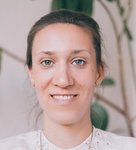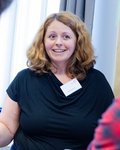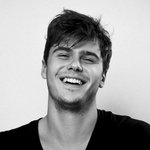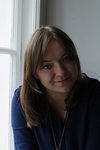"Building a strong civil society is something that requires constant engagement" — An interview with people who make the Kreisau-Initiative’s work have an effect
The long-standing Kreisau-Initiative's international education activities have borne fruit. Participants of our projects, trainers, teachers, educators and partner organisations in many European countries have passed on the idea of together responsibly creating – our theme of the years 2020–2021. Below, we want you to meet four persons who engaged in their communities, shaped the change or took the responsibility after attending Kreisau-Initiative's activities.
Kreisau-Initiative: When and how did you meet Kreisau-Initiative?
Iva: I got to know the Kreisau-Initiative through the Betzavta training that took place in Copenhagen, Denmark, in 2015. This training was a deep experience of self-reflection and awareness-raising regarding assumptions and beliefs that I had in relation to the concepts of freedom, equality and justice. Five years later, I still get to remember certain moments from the training and contemplate about them. A few months later, I got an opportunity to further deepen an understanding of the Betzavta method by taking part in the training for trainers, which an experience full of confrontation with myself and opening to new worldviews.
Ovidiu: In 2015, at the age of 16, I was chosen by my high school to participate in "Building Bridges" in the media topic, and I was completely unaware of anything about Erasmus, inclusion or non-formal education.
Izabela: I met the Kreisau-Initiative thank to an email from Paulina Jaskulska, who informed me about a training course for youth educators.
In December 2016, I took part in workshops on antidiscrimination for formal and non-formal educators. The trainers were Elli Kosek and Agnieszka Ćwieląg. We applied a variety of methods: drama, forum theatre, as well as energizers. I was not familiar with many of them before.
During the event, I met many people from Poland, Germany, Ukraine, and Syria, whose activities and histories inspired me. I still am in touch with many of them.
Maja: In 2007, I was invited to speak at the "MICC" event in Krzyżowa, as a contemporary witness – to share my experiences of growing up during the breakup of Yugoslavia in the 1990s.
KI: To what extend had you had to do with non-formal youth education or inclusion before you met Kreisau-Initiative?
Iva: To a somewhat extent. During my studies, I took part in several programmes that had to do with women’s rights, gender equality and, in particular, violence against women. I enjoyed the learning context very much. I was much more motivated to learn in a context in which methods of non-formal education are applied.
Ovidiu: Not at all.
Izabela: During my high school time, I had some contact with non-formal education. It was not the school tough who initiated activities but an association called AKiMRA in Rawicz where I come from. Back then, we, students, used to meet with local activists and organise many cultural events, concerts and theatre performances. In that time, I learnt a lot: how to use my voice, how to get warm before spectacles, how to interpret lines and how to convey feelings when standing on the stage. Taking part in the association’s activities was an enriching experience for me.
Maja: I was very involved as an international debate and critical thinking coach and trainer, so you could say I had substantial experience with non-formal youth education.
KI: Did you have any moments of sudden insight while working with the Kreisau-Initiative? Something you will never forget? Something that has had an impact on your private or professional life?
Iva: There have been many moments that have had a great deal of impact on my private and professional life, and it is difficult to point to only one of them. Many of these moments could seem rather unexceptional, but I found them very stimulating. It was mainly the insights that participants or my colleagues would share during the pieces of training that inspired me to continue learning and expanding myself. The expressions of the wisdom of young people were particularly very inspiring.
Ovidiu: I have to admit that my first experience with Kreisau-Initiative hit me really hard with a wave of diversity, culture and large smiles. Many smiles. Meeting so many people from different backgrounds made me realise that there is so much to learn from others and so much love that you can share with them.
The most exact moment I remember is that at the end of the project, I laid down on the grass reflecting about that tremendous week I had, and I started bursting into tears of happiness thinking of how grateful I can be about all that surrounds me.
The project’s aim was social inclusion for young people, and a big part of the participants had in some way a disability, so everybody worked as a team to cheer up the others, and the energy level was very high because everyone was having fun even though many needed translator. We all talked love language, and thankfully, we don’t need translators for that.
Izabela: There were many such moments. I remember the journey back home after my first training course in 2016. I was sitting on the train, trying to adapt all the just learnt methods to my teaching praxis as a German teacher. In subsequent days, I applied them often in primary school as well as in high school. I remember the surprised faces of my students after the class they had spent away from the banks. In my teaching practice, I still use methods and exercises I learnt in Kreisau-Initiative’s training courses.
Another insight I gained, very significant for me personally, was developing teamwork skills during the training courses offered by the Kreisau-Initative. I used to think that individual working was much better. Now I see that working in a team can bring much better outcomes and is an excellent, inspiring exchange of ideas. And if you turn them into actions, they can bring great results.
I wish there were more time and space for creative activities and teamwork in school.
Maja: MICC as a project has been such a transformative experience, to the point that five years after first learning about it, I succeeded in fundraising for a spin-off project, Model International Criminal Court Western Balkans – MICC WeB. This project, which started in 2013 and continues today as an educational programme, gathers youth from Bosnia-Herzegovina, Croatia and Serbia in an exploration of common difficult history, both World War II and that from the 1990s, and builds bridges and friendships among them. It is a special educational programme and a transformative learning experience, both for us trainers and the youth involved.
KI: What can non-formal youth education, as offered by the Kreisau-Initative, accomplish?
Iva: I think that non-formal youth education, as offered by the Kreisau-Initative gives young people amazing opportunities to get to know themselves better, discover their skills and qualities, to expand their horizons, to make friends from all over the world and most importantly to get a better understanding of the societal issues.
Ovidiu: I witnessed, and I know that the non-formal education offered by the Kreisau-Initiative can create new perspectives, open new doors and offer a huge amount of knowledge to everyone, not only the youth. I will always say that Kreisau-Initative is a life-changing experience and a family which awaits everybody to join them.
Izabela: I think in non-formal education, young people can experience many new things. In exchange programmes, they meet new people from foreign countries, overcome language barriers, learn how to communicate, develop their foreign language skills, and combat stereotypes. They develop their interests or explore fields of interests. They learn to know not only other people but also themselves. More often than not, it is an intensive self-development process that happens naturally and unforced. It is related to new experiences and emotions that come along. During encounters, young people learn how to cooperate and become more self-confident. Non-formal youth education, as offered by the Kreisau-Initative, is a great added value for both participants and trainers.
KI: What impact did the cooperation with the Kreisau-Initative have on your professional life or social engagement?
Iva: I use many methods of getting to know each other, evaluation methods, methods for self-reflection, and group work methods.
Ovidiu: Besides the emotional and psychological extreme changes I encountered, I became much more curious about non-formal education because the trainers and the organisers were very open and were trying to inspire us to embrace learning and experiencing new things. With time, I started participating in more projects, tasting more cultures and getting more educated with good non-formal practices. Because of these experiences, I learned to speak English, got rid of the public speaking fear and made many new friends and partnerships.
Izabela: Thanks to the cooperation with the Kreisau-Initative, students in the school I work in started to participate in international exchange programmes. Many of them cannot wait to go another time.
Fascinated by the encounters and their form, I have initiated exchanges between primary school students in Golina Wielka and their peers in Germany – as for now, from Cologne and Gelsenkirchen.
I often try to combine into my classes memory games, pantomime, riddles, skits or story cubes. My favourite exercise is the flower: students work in groups, and their task is to find similarities between them. This way, they find common ground and are better integrated as a group.
The cooperation with the Kreisau-Initiative involved attending the training series “Get Involved” and joining the trainer pool. Being a trainer is a valuable experience for me. I meet new people, learn various methods, learn how to recognise a person’s and group’s needs, and how to work in a team. It is also an opportunity to see what are areas I need to work on.
KI: [complete the sentence:] Building a strong civil society …
Maja: … depends on the civic engagement and interaction between different individuals, groups and organisations.
Iva: … is something that requires constant engagement, it is a never ending process that requires an effort, patience and courage to take part in.
KI: What is needed to reach more target groups?
Maja: … we need to stop perceiving and approaching people in terms of what category or ‘target group’ they belong to.
Izabela: …bringing into the wide audience (educators, teachers, youth workers, parents, young people in small towns) the positive outcomes achieved by non-formal education. We should encourage young people to undertake initiatives in their local communities. We should show that learning does not have to happen in the classroom only. Education can come in various forms and give a lot of inspiration.
KI: [complete the sentence:] I like to cooperate with the Kreisau-Initiative because …
Iva: … I feel like I can personally grow and contribute to the growth of other people who take part in the programs of Kreisau-Initiative.
Ovidiu: … it gives me the motivation to be a better person, and in the same way, it is a huge source of knowledge and inspiration.
Izabela: … it gives me joy, inspiration, and motivation.
Maja: ... I have made some wonderful colleagues and friends over the years, and because Krzyżowa embodies such a powerful, inspiring and everlasting message.
KI: Is there anything left you wish to say to us?
Iva: Based on my experiences working with Kreisau-Initative, I believe that the work of this organisation is something that changes the lives of many people and encourages them to continue shaping their environment in an inclusive and sustainable way. The work of Kreisau-Initative contributes to inclusion, diversity, tolerance, mutual understanding, protection of nature and community building and therefore, at the times of challenges that we are facing in our society nowadays, I see it relevant more than ever.
Ovidiu: I was blessed to have the opportunity to be a participant, a volunteer and a translator. At every level, I noticed improvements in me because I had to be more active and more engaged in non-formal activities and inclusion. With time, my interest in becoming even a trainer highly increased, and now I am learning to become a trainer in non-formal education with the aim of social inclusion.
Izabela: I am happy about the cooperation with the Kreisau-Initiative. I am looking forward to every project, every encounter, every workshop me or my students can take part in.
KI: Thank you very much for the interview!

Iva Bubalo
Land: Croatia
Association with the Kreisau-Initative: former trainee, currently a trainer in all three focal areas in the Kreisau-Initiative
”Building a strong civil society is something that requires constant engagement; it is a never-ending process that requires an effort, patience and courage to take part in.”

Dr Maja Nenadović
Land: Croatia/ Hungary
Association with the Kreisau-Initative: trainer in “Model International Criminal Court” (MICC)
“What motivates me to educate young people about human rights is the fact that human rights education is a never-ending responsibility and commitment, as each new generation needs to understand the dangers of ignoring human rights and succumbing to fear, distrust, hate and intolerance that are at the core of us versus them polarized thinking.”

Ovidiu Oniciuc
Land: Romania
Association with the Kreisau-Initative: took part in five “Building Bridges” editions as a participant, interpreter and volunteer
“I like to cooperate with the Kreisau-Initiative because it gives me the motivation to be a better person, and in the same way, it is a huge source of knowledge and inspiration.”

Izabela Pieprzyk
Land: Poland
Association with the Kreisau-Initative: as a teacher accompanied students in many exchange projects and as a participant attended many training courses by the Kreisau-Initiative
“I am happy about the cooperation with the Kreisau-Initiative. I am looking forward to every project, every encounter, every workshop me or my students can take part in.“
